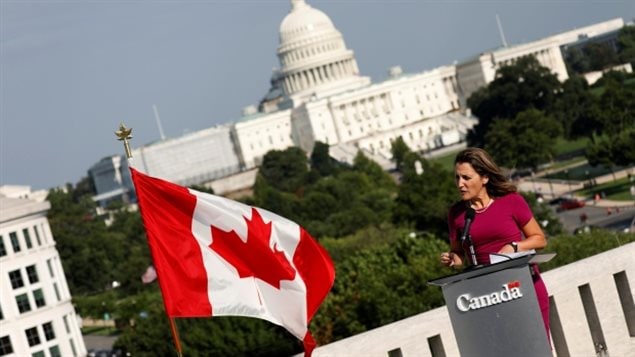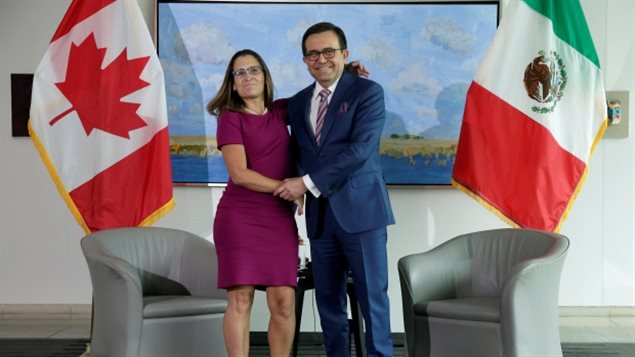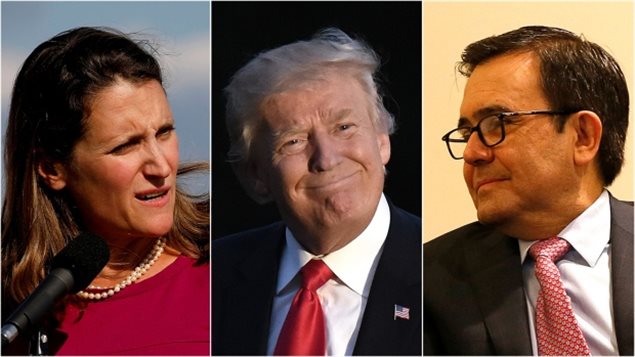Prior to his election, U.S. President Donald Trump roundly criticized the North American Free Trade Agreement (NAFTA). The deal involves Canada, the U.S., and Mexico.
He has since ordered a re-negotiation and the first five-day round of the those talks has taken place, ending this past Sunday. Two more rounds will take place in September, first in Mexico then in Canada late in the month. More talks will take place in October in the U.S. with others continuing late in the year and into early 2018.
The Council of Canadians, a non-profit environmental and democracy advocacy organisation says this is an opportunity to correct aspects of the deal they say compromise workers rights and the environment in Canada.
Brent Patterson is the political director at the non-profit advocacy group The Council of Canadians
Listen
The Council has long expressed concern over many aspects of the current NAFTA agreement, and potential new areas the U.S. has indicated it wants to negotiate, including gaining access to certain markets where it is currently blocked, such as Canada’s supply management policy in such things as dairy.
The Council is also concerned about the possibility of commodifying water resources where Canada’s water resources could be bought and shipped south.
It has long criticised the dispute mechanism in the current deal known as Chapter 11 which allows corporations to sue governments over any policies or laws that restrict corporate profits. Canada has been sued 38 times under NAFTA which has cost taxpayers astronomical sums, and is currently facing $2.6 in pending cases, many over Canadian environmental protection regulations.

The Honourary Chairperson of the Council, Maude Barlow, recently said in a press release, “If (Canada’s) government is truly concerned about the environment, labour and public protection, it should look at the glaring problem: Chapter 11, which has made Canada vulnerable to billions of dollars of corporate lawsuits over our environmental and public policy decisions. Trudeau should be fixing NAFTA’s existing problems, instead of creating new ones.”

The Trade Campaigner for the Council, Sujata Dey points out other concerns, ““It is very dangerous that the Liberal government is going to put CETA procurement provisions in NAFTA, which will get rid of buy local policies. Instead, Trudeau should be mirroring Buy American policies so that public money stays in the local economy. We also encourage the government to hold the line on in keeping NAFTA’s cultural exemption and our supply management program.”
Representing a large group of farmers across Canada, the National Farmers Union is also expressing concern. In a press release the group said, “Under NAFTA and its forerunner, the Canada-US FTA, farm input costs have gone up and inflation-adjusted commodity prices have dropped, yet the farmer’s share of the grocery dollar is smaller. We export more, but imports have increased faster, which means our share of our own domestic market is actually shrinking.

Jan Slomp, President of Canada’s National Farmers Union added. “NAFTA and the FTA have not helped farmers. Since 1988 we have seen one in every five of our farms disappear and we’ve lost over 70% of our young farmers, even though Canada’s population has increased”.
Trump: “we may end up terminating NAFTA”
This week, U.S. President Trump said publicly, he’s not sure that the U.S. will get what it wants in a renegotiated deal and may just terminate the trade agreement.
Most analysts and even the Mexican Foreign Minister, Luis Videgaray, are dismissing the comments as little more than a negotiating tactic.
American political analysts also note that it would be difficult if not impossible for a president to unilaterally terminate the deal as the U.S. Congress is responsible for regulating trade.







For reasons beyond our control, and for an undetermined period of time, our comment section is now closed. However, our social networks remain open to your contributions.